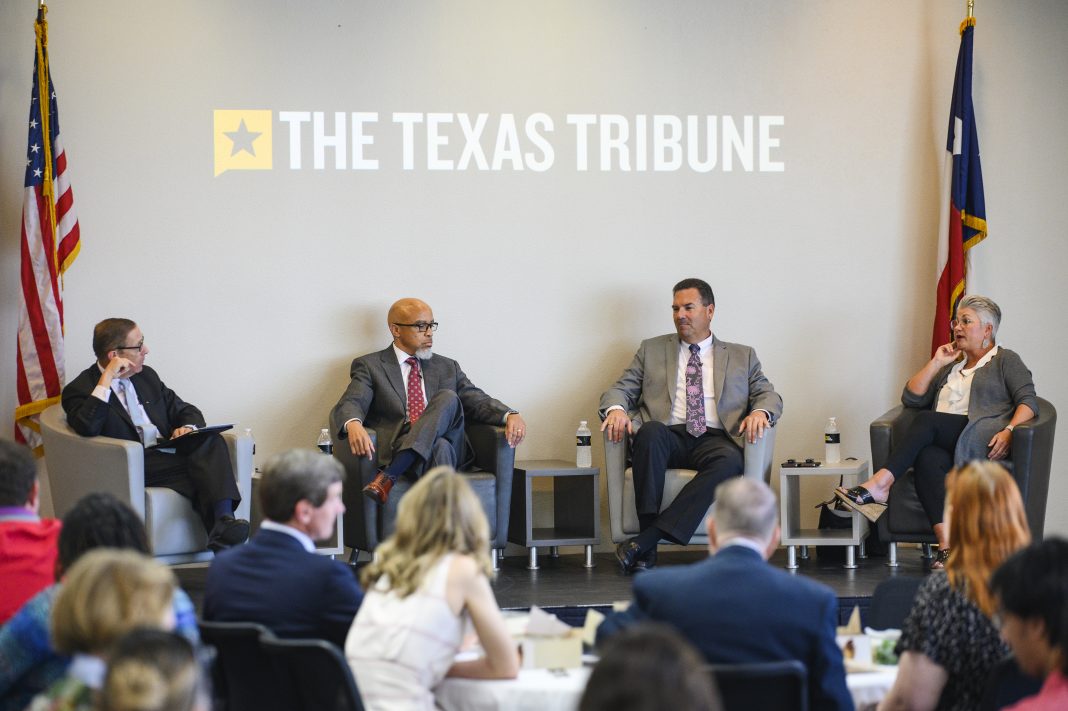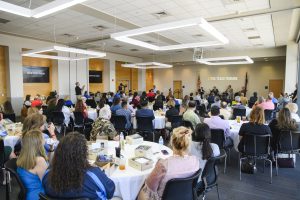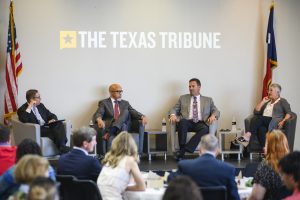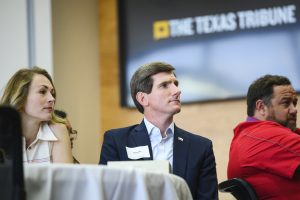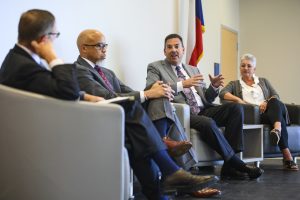Stressing innovation, cooperation and hard work, presidents of Odessa College and University of Texas Permian Basin, along with the Ector County ISD superintendent talked success and struggles.
Held in the Zant Community Room at the Salisbury Campus Center at OC, the occasion was The Texas Tribune’s Great Student Resignation. Speakers were OC President Gregory Williams, UTPB President Sandra Woodley and ECISD Superintendent Scott Muri.
Texas Tribune Co-Founder and CEO Evan Smith was the moderator. It was in person and livestreamed.
Bucking the trend of declining higher education enrollment, Woodley and Williams noted the hard work of faculty and staff, quality virtual instruction and retail politics — getting out to students and families to let them know it’s the right time to be in higher education.
Topics also included the college-going culture in this region and the state, what the pandemic in year three did to enrollments in four-year schools and community colleges and to the progress that the state’s public school districts have been making in getting their young charges to think about higher ed “as the logical next step on the journey to become our future workforce, our future voters and the future stewards of our democracy …,” Smith said.
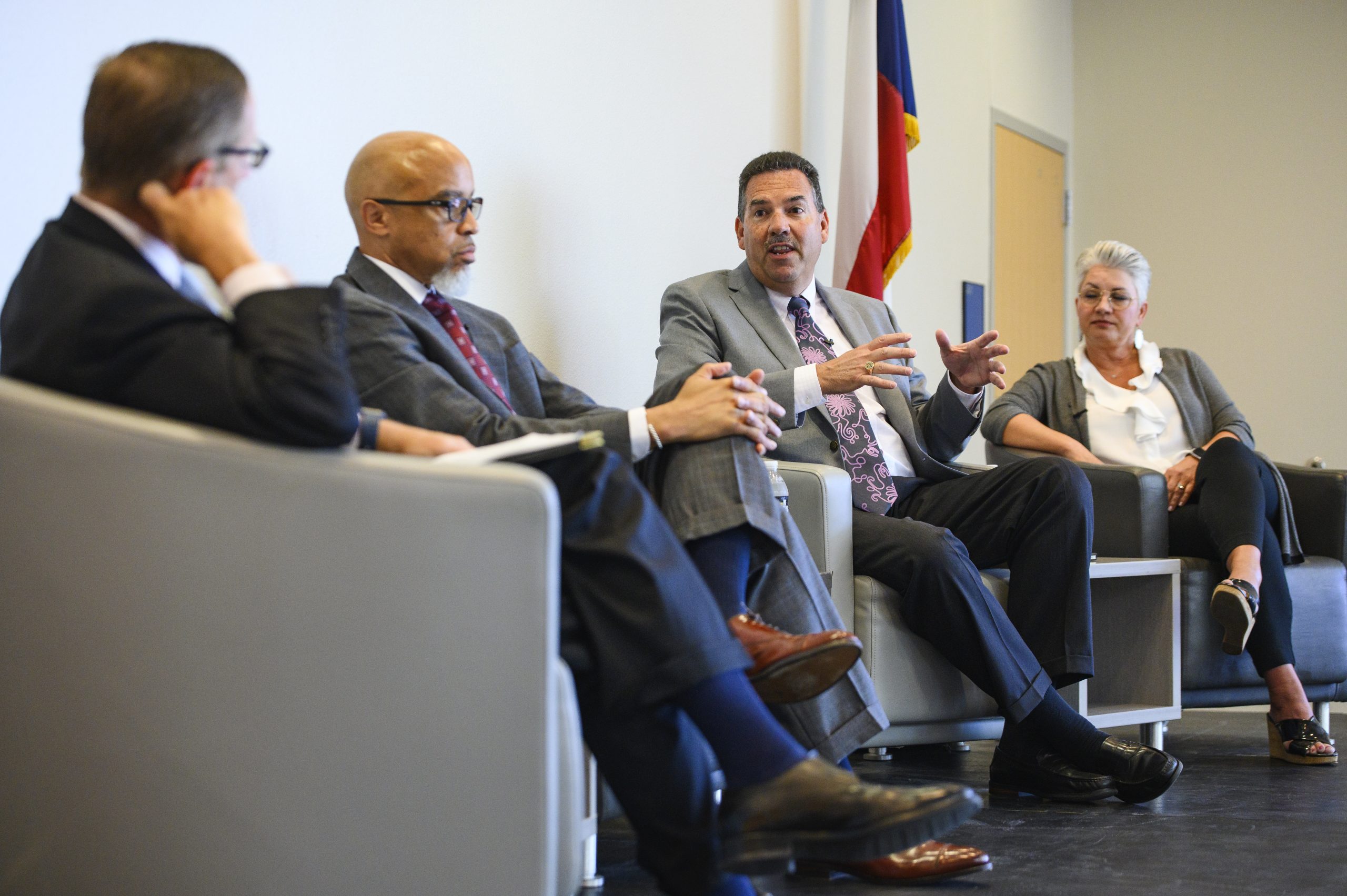
At the beginning of the pandemic, Woodley said UTPB saw an increase of about about 5% in its enrollment.
“Last year, we lost about 375 students, but this year, we’re on a pretty significant (upswing). We have about a 27% increase in student credit hours at this point compared to last year and about 11% in enrollment. So there are a lot of factors for that,” Woodley said.
“For us, we put in five years of hard labor; really organizing our processes and our scholarships and optimizing every single thing that we can do to convince the people in the Permian Basin to (come here). I think most recently the Falcon Free programs that the University of Texas System funded (where) you make $100,000 or less you can get your tuition and fees covered right at UT Permian Basin is another factor ….,” Woodley added.
Asked if UTPB employs wholesale and retail politics to get people to attend UTPB, Woodley said it’s both.
“… That human touch is really crucial for us, to be able to get out in the community and spend time in high schools and spend time at the community college. … We really have to meet people where they are in the Permian Basin. But the overall brand awareness of the university and the advertising and the social media strategies have been crucial, too,” she added.
Pre-pandemic, Smith said community colleges represented more than 50% of higher education enrollment. Now that percentage has dropped just below 50% during the pandemic.
“We all expect it will go back up. And the trend is what I’ve said 13% or so, 13.2 percent, I believe, is the drop in community college enrollment statewide since 2019. But you’ve cut against the grain …,” Smith said.
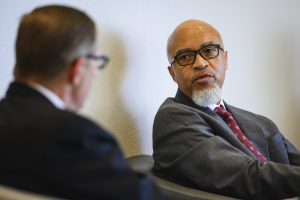
Williams said the secret to OC’s success is the faculty, staff and community.
“This tremendous community, my partners here, we at Odessa College we’ve been on a mission for a long, long time trying to do amazing work …,” Williams said.
When he started at OC, there were a little more than 4,000 students.
“Last fall, we broke 8,000 students for the first time in our history, which was a tremendous thing for us to do,” Williams added.
During the pandemic, he said, OC has increased enrollment roughly 17 1/2 to 18 percent.
Williams said what’s different at Odessa College compared to others is the culture.
“… I think part of that culture started in 2011. We had something that we call the defunding scare …,” Williams said.
They decided they would not be in that position again. “So others can do what they do, but we’re going to be amazing. We can’t control what the legislature does,” Williams said.
Muri has been superintendent at ECISD for three years.
“… The college going culture, I think, was on the rise and I would really attribute some of that to the colleagues that are on either side of me today,” Muri said.
He added that he, Williams and Woodley worked collaboratively.
“We think P-20 (prekindergarten through college) … as a community. We understand the value of the opportunity …,” Muri said.
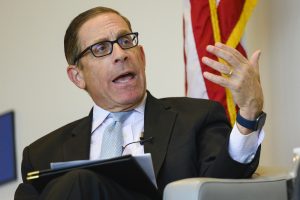
In Texas today, Muri said, 70% of jobs require some form of post-secondary credential.
“We talk to our students about that, even throughout the pandemic, we had those same conversations. So that means that our kids, at least 70% of them, have to have some form of post secondary,” whether that is a four or two year degree, some form of technical certification, or service in the military, Muri said.
“… So we have to create that culture within our elementary, middle schools and high schools that, again, feed these two institutions. It’s also partnering with both of these individuals. We have programs in place today that allow our students to become a part of them while they are with us. So you’re a high school student and you can leverage opportunities at Odessa College or UTPB to experience dual credit (and) dual enrollment opportunities. Again, that plants some seeds in the minds of our students. It certainly helps them think more broadly about opportunities beyond that …,” Muri added.
Smith said there has been a 4.1% drop in enrollment in higher education overall since 2019; 13.2% in community colleges.
“But another way to cut those numbers is that the enrollment in higher ed fell 5% over the decades before COVID in Texas … and then dropped another 6% in 2020 alone. So another way to think about that is there’s been a 53% increase in non-enrolling high school students since 2010, which is extraordinary,” Smith said.
“Currently only one in four Texas eighth graders graduate with a post secondary credential … Only one in four get a credential by age 24 and among economically disadvantaged kids, it’s double that. It’s one in eight. …,” Smith said.
He added that 54% of jobs in Texas are middle skills jobs, which means they require more than a high school diploma but less than a bachelor’s degree. However, only 45% of Texans are trained for those jobs.
Sixty-one percent of Texans don’t have a post secondary credential. Those with a high school diploma, only 13% earn a living wage, Smith said.
“Only California has more young adults ages 25 to 34 without an associate’s degree or higher. Texas is second worst in the country for that. California is the worst …,” Smith said.
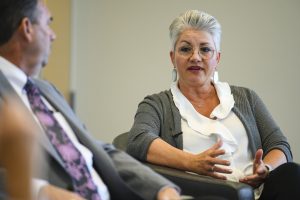
Woodley said she and her colleagues here recognize that they are underperforming in the sense that college going trends aren’t as high as they need to be in the Permian Basin.
“For the knowledge-based jobs that are here today and … the ones that are rolling in, the Permian Basin is producing 50% of U.S. energy. That’s only going to go up. Look at renewables and all the things that are going on here. Occidental announced that they’re going to have the largest carbon capture facility here in the Permian Basin,” Woodley said.
“I think all of us feel the urgency to convince people to think about going to college after high school, to get them involved at some points and get them going. I myself am the person who took 10 years to get my undergraduate degree; worked full time. I have lots of colleges on my transcript. Most of my students, in fact, 55% of our students, are part-time and I don’t consider that a failure when you can make $100,000 a year driving a water truck. I’m not going to disparage you for doing this,” she added.
Woodley said very few of her students are first-time, full-time students.
“… If you look at the graduation rate and persistence rate, at the first-time, full-time freshmen, for example, we have less than 500 out of 7,000 students who started as a first-time, full-time freshman. Most of what we do is to support students who have been in the community college, or who have some college and no degree; stopped in and stopped out. I think our challenge is to de-stigmatize that …,” Woodley said.
She added that almost half of UTPB students are first-generation college students.
Williams said about 60 percent of his students are first-generation as well.
Muri said House Bill 3 made a “remarkable dent” in prekindergarten through 12th grade funding.
“… Public schools across the state of Texas have been very appreciative of that and responsive to that … But investments in public education and higher ed must continue as the world continues to evolve and if we want Texas to truly create and produce students that meet the workforce needs, then investments need to be made,” Muri said.
Woodley said the public health emergency that was COVID was challenging.
“I think we came through the challenge very well. I think all of us did. You don’t know how things are going to go until you’re in the thick of it. But we flipped very quickly to virtual learning; very high quality virtual learning. But the pandemic took a toll on our students, our faculty and our staff. All of the uncertainty, the changes that had to happen to make the experience for the students continue to have high quality … was challenging, but I think we did very well,” Woodley said.
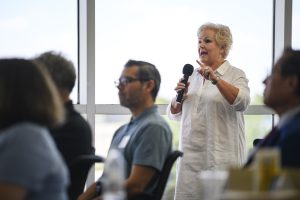
Woodley, Williams and Muri said the COVID experience made them stronger.
“Ultimately, it made us better at what we do. It prepared us more for the virtual environment. We were already moving in that direction. Our faculty members were prepared. We have a really good team at the professional learning center where we had started to do more things virtually … so the pivot was a lot easier for us. Our faculty, again, is always developing and improving their skills …,” Williams said.
He added that OC stayed on the job, although they were virtual.
“… We never went away … We never closed our doors. We never stopped. We continued to support our students. For those people who were doing front-facing work, we couldn’t do that anymore. We pivoted them to a support environment where they were reaching out and helping to keep (students) in class …,” Williams said.
Muri noted that there was no playbook for dealing with a pandemic. He was standing on the streets of Marfa when he got a phone call from Texas Education Commissioner Mike Morath saying they would probably have to close school for a couple of weeks. He came back to town and they opened school that Monday in a completely virtual environment.
“… There was no plan, so it was a whole lot of collaboration, pulling really smart people together and learning from them and figuring out how to move forward. And we did it and created that playbook and have experienced success because of that. But it wasn’t easy. There wasn’t anything to refer to and it affected our kids and our adults in a variety of ways. We learned a lot through that experience; a lot of things that have made us better today, so we’re very thankful for that. The resiliency of our kids was impressive. The way that our staff and faculty responded and created solutions that had never been created before. So kudos to all of those people,” Muri said.

